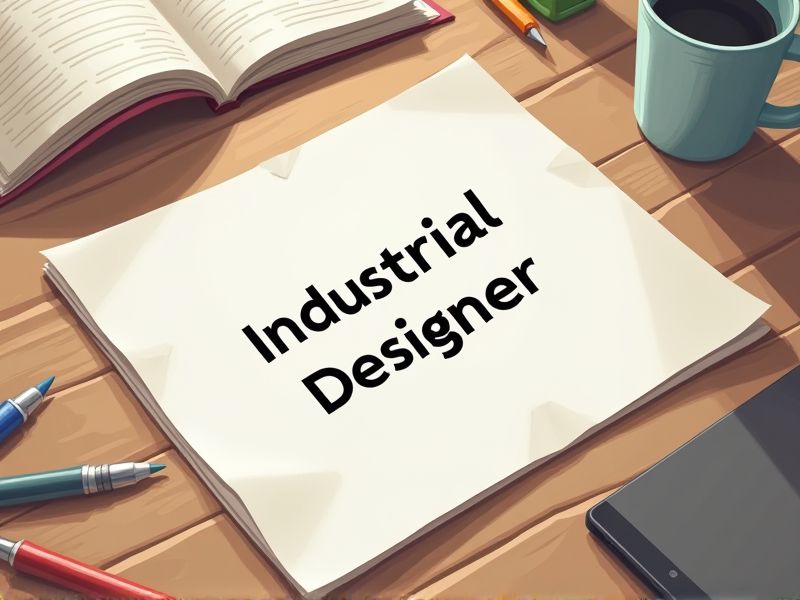
Industrial designers often work at the intersection of aesthetics, functionality, and manufacturing, where specialized knowledge can enhance their capability to deliver market-ready products. Certifications validate a designer's expertise in areas like ergonomics, sustainability, and materials, aligning their skills with industry standards. This formal acknowledgment serves to instill confidence in employers and clients by ensuring adherence to best practices. Here are some important certifications that may benefit you as an industrial designer.
Certified SOLIDWORKS Professional (CSWP)
Holding a Certified SOLIDWORKS Professional (CSWP) credential validates an industrial designer's proficiency in advanced modeling skills, which is crucial for efficient and precise product design. Employers often seek designers with this certification as it indicates a capability to enhance product development workflows, leading to reduced design errors and manufacturing costs. The certification also fosters a competitive edge in the job market, highlighting a designer's commitment to continuous skill development. Verified expertise in SOLIDWORKS can facilitate smoother communication among multidisciplinary teams, improving collaboration and project outcomes.
Adobe Certified Expert (ACE)
Becoming an Adobe Certified Expert (ACE) enhances an industrial designer's credibility and validates proficiency in Adobe software crucial for design tasks. This certification often leads to increased job opportunities and career advancement, as employers recognize the designer's expertise with industry-standard tools. Mastery of Adobe software through the ACE program can streamline the design process, allowing designers to create more efficiently and innovate effectively. The certification also reflects a commitment to ongoing professional development, which is highly valued in the competitive field of industrial design.
Autodesk Certified Professional: AutoCAD
An Autodesk Certified Professional: AutoCAD certification validates an industrial designer's proficiency in using AutoCAD, enhancing their capacity to produce precise and efficient designs. This credential often increases the designer's employability and opens up more advanced job opportunities, as employers seek individuals with certified skills. Knowledge gained through the certification process leads to more efficient project workflows, reducing time and costs for design firms. Having this certification elevates a designer's credibility and professional standing in a competitive job market.
Autodesk Certified Professional: Inventor
An Autodesk Certified Professional in Inventor validates an industrial designer's expertise, increasing job prospects due to the demonstrated proficiency in advanced CAD software. Certification enhances an industrial designer's ability to create efficient, precise digital prototypes, streamlining the design and production process. Employers value certification as it signifies a commitment to continuous learning and industry standards, thereby improving project outcomes. Holding this certification often leads to higher salary opportunities, reflecting the specialized skills and knowledge certified professionals bring to the industry.
Certified CAD Professional (CCP)
Industry demands for precision in design and manufacturing make the Certified CAD Professional credential a valuable asset for an industrial designer. Specialized CAD skills enhance an industrial designer's ability to create accurate and detailed models, reducing errors in the production process. Certification validates the designer's expertise, increasing their credibility and employability within the competitive job market. Employers often seek certified individuals to ensure efficient use of resources and advanced solutions in design projects.
Certified Industrial Designer (CID)
A Certified Industrial Designer (CID) ensures high standards of professionalism and competence in design projects, leading to improved product quality. Certification provides validation of an industrial designer's skills and knowledge, which fosters trust among clients and employers. The CID credential can enhance career prospects and opportunities for industrial designers in a competitive job market. Adherence to certification standards promotes innovation and user-centered design thinking, benefiting both companies and end-users.
Human Factors and Ergonomics Society (HFES) Certification
Achieving HFES Certification demonstrates an industrial designer's expertise in optimizing human-product interactions, promoting safety and efficiency. This certification enhances credibility, attracting employers seeking professionals trained in ergonomics and human factors. With HFES credentials, designers can integrate user-centered design principles more effectively, reducing the risk of product-related injuries or inefficiencies. The certification also signifies a commitment to staying updated in the field, improving competitive advantage in a technology-driven market.
Certified Manufacturing Engineer (CMfgE)
A Certified Manufacturing Engineer (CMfgE) brings advanced technical skills that help industrial designers integrate manufacturing feasibility into their designs. This certification ensures that designs are optimized for cost-effective production, reducing time and resource expenditure. Industrial designers working with a CMfgE can better anticipate potential production challenges, leading to fewer design revisions. Collaboration with a certified engineer enhances product quality while aligning with industry standards and technological advancements.
Lean Six Sigma Green Belt Certification
Industrial designers with Lean Six Sigma Green Belt Certification can streamline production processes, reducing waste and inefficiencies. This background equips them with analytical tools to enhance product quality, aligning design innovations with practical implementation. Companies often seek these skills to maintain competitive advantage by minimizing costs and maximizing output. A certified designer demonstrates a commitment to data-driven decision-making and continuous improvement.
Design Thinking Certification (e.g., from IDEO U)
Design thinking certification can equip an industrial designer with structured problem-solving methods, enhancing their creative approaches to product development. By understanding user-centric design principles, designers are more likely to create solutions that meet real needs and improve user experiences. Certification signals proficiency to employers, potentially leading to increased job opportunities and career advancement. Exposure to diverse perspectives and collaboration techniques can foster innovative solutions, driving industry progress and setting the designer apart from peers.
Summary
When you obtain certifications as an industrial designer, your professional credibility often increases. This enhancement typically leads to more opportunities for advanced projects and roles. Employers generally value the specialized skills and knowledge that certified designers bring to the table. Consequently, your career advancement and salary prospects usually improve significantly.
